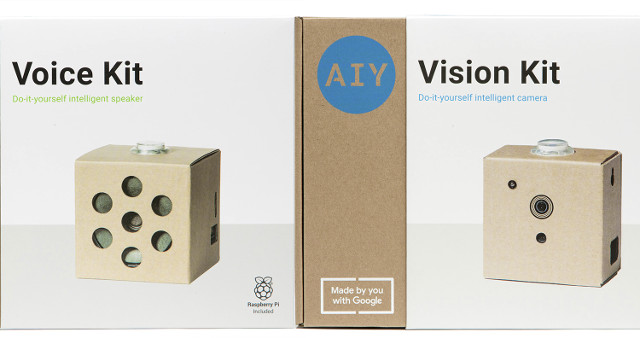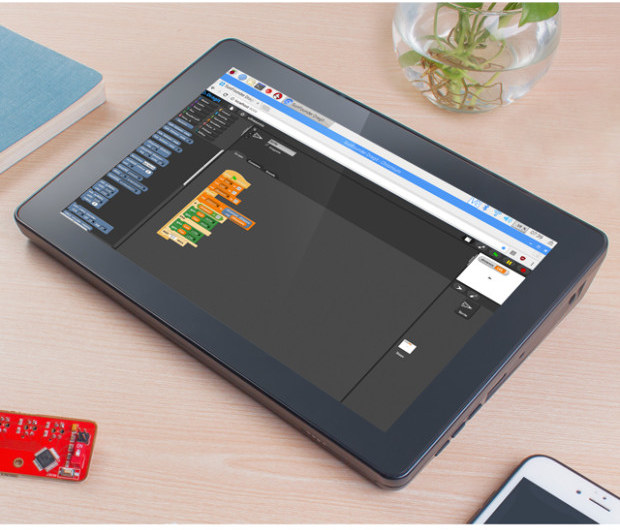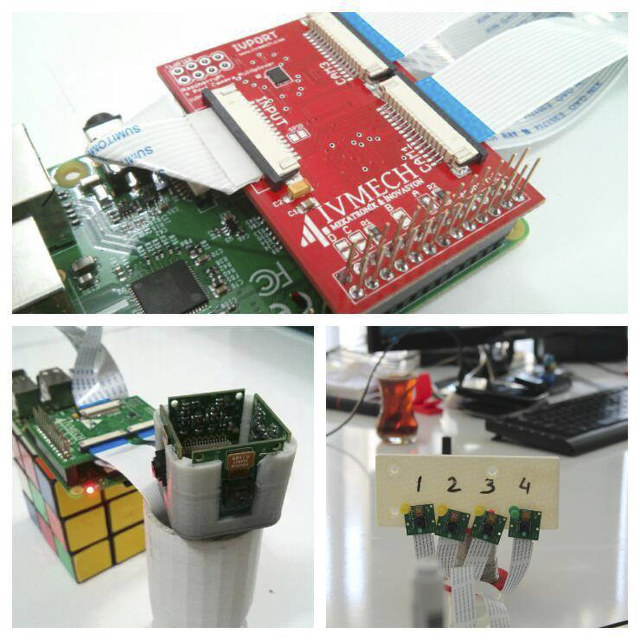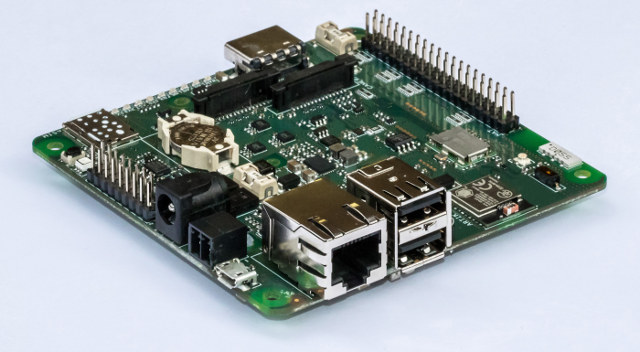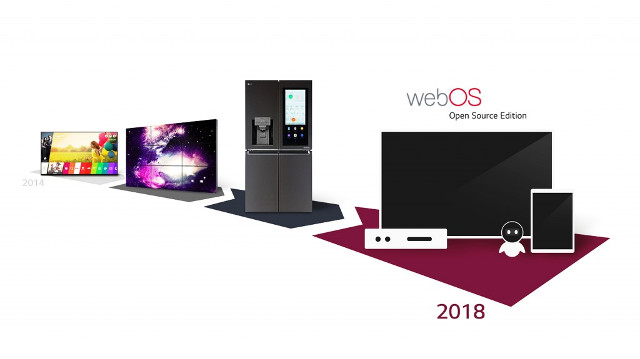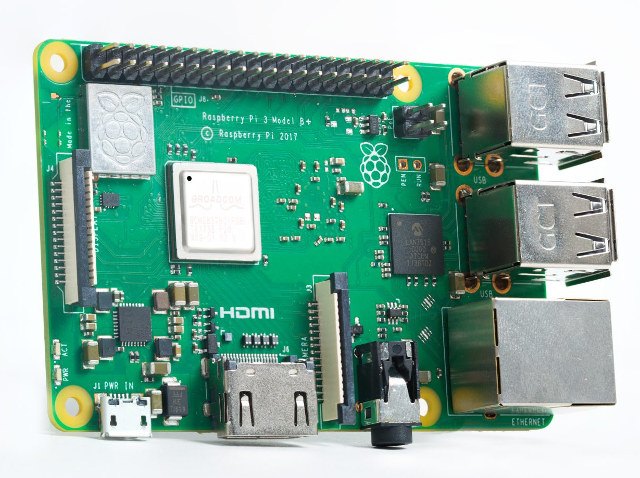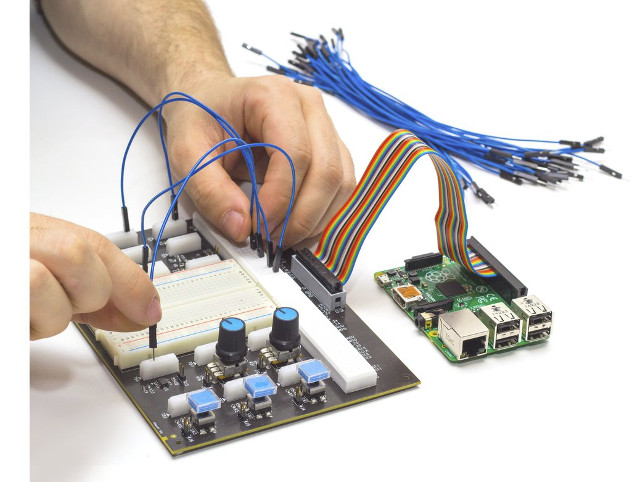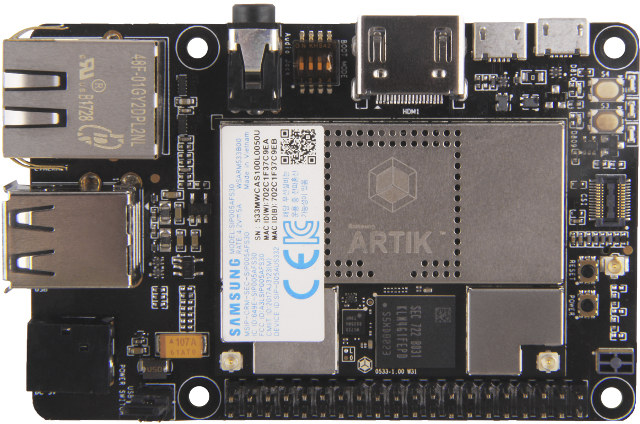Google launched two AIY Projects kits last year with a Voice Kit that took a Raspberry Pi 3 to create a smart speaker, and a Vision kit for hardware accelerated computer vision using a Raspberry Pi Zero W board. Google reports the kits are popular, especially for STEM education, but educators/parents had to buy the Raspberry Pi boards and micro SD cards themselves, as well as flash the firmware to the cards. So the company decided to redesign both kits to work with the Raspberry Pi Zero WH (RPi Zero W with headers), and include it inside the box with cable and pre-provisioned SD card, so kids can get started faster with experimentation with having to setup the kits. So that means we now have AIY Projects Voice Kit v2 with RPi Zero WH and micro SD card with firmware, as well as AIY Projects Vision Kit v1.1 with RPi Zero […]
RasPad is a Tablet Kit for Raspberry Pi 3 B+ and Other Development Boards (Crowdfunding)
Many people interesting in coding and working on projects with the Raspberry Pi just likely connect the board to a monitor, USB keyboard and mouse, and to a power adapter, but if you are interested in having some more compact and portable RasPad tablet kit may be for you. The kit is compatible with Raspberry Pi boards, including the latest Raspberry Pi 3 B+, as well as other Arm/x86 Linux development boards including Tinker Board, LattePanda or BeagleBone Black. [Update: The design likely only works with RPi form factor, so if you use other boards with HDMI output, you may have to leave them out of the housing] RasPad key features: Display – 10.1″ IPS touch screen Video – HDMI port Audio – 2W speaker, audio jack Misc – 3 buttons (volume/brightness +, volume/brightness -, power), micro “USB touch” port Battery – Good for about 3 hours Power Supply – […]
Connect Up to 16 Pi Cameras to Raspberry Pi with IVport V2 Camera Multiplexer Board
The Pi camera is a popular add-on for the Raspberry Pi boards, it connects to the MIPI CSI connector of the board, and offers better performance than USB cameras. But we are now seeing computer vision applications using more than one camera with stereo vision, 360 degree camera setups, and so on. One way would be to connect a Pi camera, and use the USB ports for the extra cameras, but Canerdurmusoglu had another idea, and instead designed IVport V2 Camera Multiplexer Board allowing you to connect up to four official Pi cameras to a single Raspberry Pi board. The maximum number of supported cameras is 16 since several boards can be daisy- chained. IVport V2 works with Raspberry Pi Camera Module V2 (8MP version), and you can switch between cameras using 3 GPIO pins. If I understand correctly that setup does not allows you to use all the cameras […]
BalenaFin is an Industrial Carrier Board for Raspberry Pi CM3L Module Designed for Fleets of Connected Devices
[Update January 2019: Resin.io Project Fin has been renamed to BalenaFin, I have not changed the rest of the article] Resin.io is a both a company and a software platform that includes device, server, and client software to get code securely deployed to a fleet of devices. Devices are setup to run ResinOS, and to deploy you app, you just need to push the code to resin.io build servers, where it will be packaged into containers and delivered to your fleet of boards. So far, resin.io relied on existing hardware platforms like Raspberry Pi 3, BeagleBone Black, or Intel NUCs, but they’ve now decided to launch their first hardware with Project Fin that takes a Raspberry Pi Compute Module 3 Lite, is hardened for field deployment use cases, and adds some of most commonly requested hardware features such as variable supply voltage support, RTC, and cellular connectivity (via mPCIe card). […]
LG Releases webOS Open Source Edition Optimized for Raspberry Pi 3
webOS, originally developed by Palm, is a Linux based multitasking operating systems with support for HTML5 and CSS3. It is now found in most (all?) new LG smart TVs, and the TV manufacturer has decided to expand the adoption of webOS by collaborating with the South Korean government and local startups, and released an open source version , webOS Open Source Edition, available publicly at http://webosose.org. webOS Open Source Edition 1.0 is said to be optimized for the Raspberry Pi 3, and the company provides build instructions on the “setting up” page of the website to build the firmware image, which you can then flash to a micro SD card. The idea is to for a community around the open source version webOS, and let different categories of developers or users contribute to the project: System UI Developers – The System UI is based on Blink and Qt, and developers […]
$35 Raspberry Pi 3 Model B+ Launched with a Faster Processor, 802.11ac WiFi, Gigabit Ethernet, and Optional PoE
The Raspberry Pi Foundation has just introduced a updated version of their popular Raspberry Pi 3 Model B board with a Model B+ that increases the processor clocked up to 1.4 GHz, adds dual-band 802.11ac WiFi, and Bluetooth 4.2, Gigabit Ethernet (via USB 2.0 to Ethernet bridge), as well as support for PoE (Power-over-Ethernet) via an external HAT add-on board. Raspberry Pi 3B+ specifications: SoC – Broadcom BCM2837B0 64-bit ARMv8 quad core Cortex A53 processor @ 1.4GHz with dual core VideoCore IV GPU System Memory – 1GB LPDDR2 Storage – micro SD slot Video & Audio Output – HDMI 1.4 and 4-pole stereo audio and composite video port Connectivity – Gigabit Ethernet (via Microchip LAN7515 USB 2.0 to GbE bridge), maximum throughput 300 Mbps), WiFi 802.11 b/g/n/ac and Bluetooth 4.2 LE (via Cypress CYW43455 based module) USB – 4x USB 2.0 host ports, 1x micro USB port for power […]
EveLab 1.0 is an Advanced Breadboard Solution Designed for the Raspberry Pi
While it’s perfectly feasible to connect the Raspberry Pi board to a breadboard it can become relatively messy if your projects needs many I/Os due the wire and extra components like resistors, so “Robot In A Can” designed a circuit trainer for the University of Guelph students to wire projects with the Raspberry Pi’s (26-pin) header in a neater way, and made it durable to to endure years of use in a lab setting. The developer has now started selling the hardware, and called it EveLab 1.0. Evelabs 1.0 specifications: 2x 32×4 breadboards with markings for GPIO pins 1x “standard” breadboard 3x LEDs (pre-grounded) 3x Momentary Switch (pre-grounded) 2x Potentiometers (pre-grounded) 1x RGB LED (pre-grounded) 1x Analog to digital converter (2-inputs pre wired) 1x Light Sensor 1x Temperature Sensor The board also comes with 2 GPIO ribbon cables to connect to various Pi models, and 20 Jumper cables. The target board […]
Eagleye 530s Board Features Samsung Artik 530s IoT Module, Leverages Raspberry Pi Form Factor
Samsung Artik 530 is a module designed for the Internet of Things based on a quad core Arm Cortex A9 processor, and supporting Ethernet, dual band WiFi, Bluetooth 4.2, and 802.15.4/Zigbee/Thread connectivity, as well as exposing display and camera interfaces, and of course various I/Os. The module was launched about one year ago with a developer kit that cost $189 and up, but Samsung has now worked with Seeed Studio to launch a cheaper developer board – called Eagleye – based on the secure version of the module (Artik 530s) and mostly following Raspberry Pi form factor in order to take advantage of its hardware ecosystem. Eagleye 530s board specifications: SoC – Unnamed quad core Arm Cortex A9 processor @ 1.2GHz with 3D graphics accelerator System Memory – 1GB DDR3 Storage – 4GB eMMC flash, SD card slot Connectivity 802.11a/b/g/n dual band SISO (2.4G/5G) Bluetooth 4.2(BLE+Classic) Zigbee/Thread 802.15.4 Gigabit Ethernet […]


